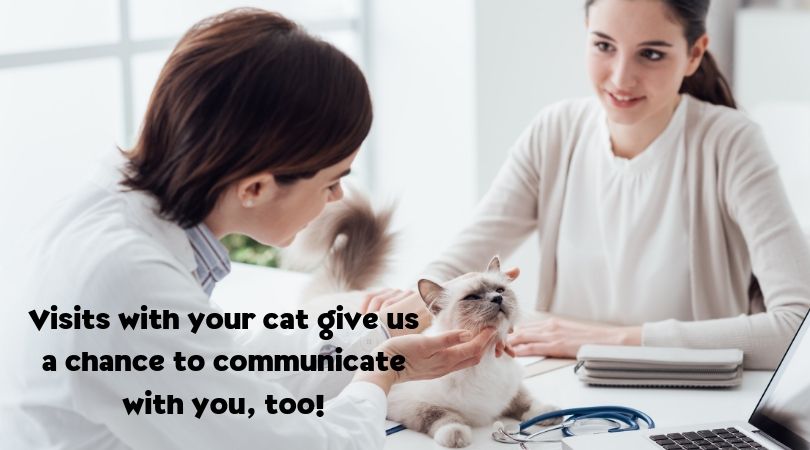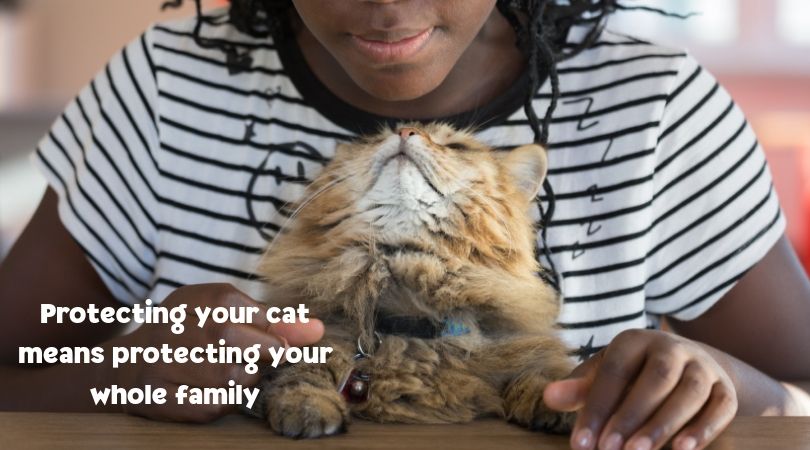August 22nd is “Take Your Cat to the Vet Day.” This day was created to help give cat owners a reminder that their feline family members need to have routine checkups just as much as their canine and human counterparts. Unfortunately, statistics show that a large percentage of cats do not get taken to the vet until they are already sick or injured. There are many contributing factors as to why this is, but a major one is that cats are very good at concealing their discomfort and pain. It’s just as important to schedule regular checkups for your cat as it is for your dog or kids.
Now, the many benefits to your cat receiving regular wellness exams are obvious. For instance, catching any health issues before they have progressed will be less expensive and easier to treat. However, did you know that your veterinary staff benefits from having your cat visit as well? Let’s take a look at some of the reasons, both cute and serious, why your veterinary team would love to see your cat on this special day -- or any day for that matter!
Job Experience
Let’s start with a serious one. We get better at our jobs the more experience we have doing them. Performing the various technical skills needed for examining your pet continually grow with hands-on experience. A great deal of training is done before we ever see your pet to draw blood, administer vaccines, take x-rays, perform ultrasounds, etc. Once the training is complete, our skills grow with each patient we see.
Not every veterinary practice pursues full fear-free certification, but all strive to create the best experience possible for their patients using fear-free techniques. The more we see your pets and you, the more comfortable they will become with us and the more familiar we will become with their personalities. This will help create a less stressful, or stress-free visit for your pets.

We value our clients and want to be able to communicate effectively and clearly with them. However, we are trained in scientific terms and jargon, and it can be easy to slip into a pattern of speaking “veterinary.” The more we get to talk to you, the more we’re able to hone our communication skills!
Checking Up on Our Work
Having regular visits with your cat is a great way for our team to follow up on any recommendations we may have made for him. Did we make any nutrition, weight, or exercise recommendations at your last visit? We want to see how that is going. Did we make suggestions on ways to brush and care for your cat’s teeth? We want to check on your cat’s oral health to see that it’s improving. If we prescribed a special diet for your kitty’s urinary health or hairball control, we want to follow up to see how that is working.
Protecting Your Pet and the Community
Keeping your cat up to date on vaccines and preventive medicines is not only vital to protecting him from infectious disease, but it is also important in protecting other pets in your family and neighborhood, as well as you and your family members.
Communicable diseases are ones transmitted from cat to cat. Even if your cat is an indoor-only cat, it’s important to have him vaccinated. There are core vaccines that are recommended for every cat, as well as non-core ones that may be recommended by your veterinarian based on your cat’s lifestyle and environment.
Zoonotic diseases are ones transmitted between cats and humans, and although less common, certain people such as the elderly, pregnant women, and people with compromised immune systems are at more risk of contracting them. Through routine exams, your veterinary team can educate you on best practices to avoid these infections, as well as confirm any symptoms your cat may be showing.
Parasite control is extremely important for the wellbeing of your cat and to the community around him. Again, even if your cat lives indoors, preventive treatment for fleas, ticks, and intestinal parasites should be used. It’s possible for fleas to overwinter in your home, leading to an infestation. To make matters worse, tapeworms are carried by fleas, so one issue can lead to another. The best and safest solution is routine visits to your vet. Your veterinarian can recommend the best flea and tick preventive treatment for your cat, as well as a heartworm preventive medication.

We Want to Help Show You Off
Have you been working on some training skills with your cat? If so, we want to see them! Have you been helping your kitty be more social and less fearful? Let’s get together and keep working on that! We love to keep up with any behavioral progress your cat is making and provide any tips we can to help it continue.
Oh, the Cuteness!
Okay, let’s be honest: cats are adorable and we just love them! No matter what age or type, from little kittens to senior cats, shorthaired to longhaired, they are cute creatures, and we love to see  them and be around them.
them and be around them.
Getting some time to spend with your cat makes us happy. Hearing the purrs and meows makes our day more relaxing and puts a smile on our faces. Is there anything cuter than jelly bean toes? And kitty cuddles – is any explanation really needed? Yes, we even like to use our “baby” voices to talk to your pet. It’s silly and fun!
Your cats entertain us as well. We like to watch them and see which areas in the exam room they like to explore. What spaces are the most interesting to them to sniff and investigate? We like to see what interesting places they may try to hide in!
Schedule Your Appointment
As you can see, in addition to being great for maintaining your cat’s health, scheduling exams on a regular basis helps your veterinary team provide the best care for your pet. We love to see your pets and get to know them better. And in turn, your cat makes us feel good about the care and service we provide to them. So please use “Take Your Cat to the Vet Day” as a reminder, if you haven’t done so already, contact us to schedule an appointment for your cat!


